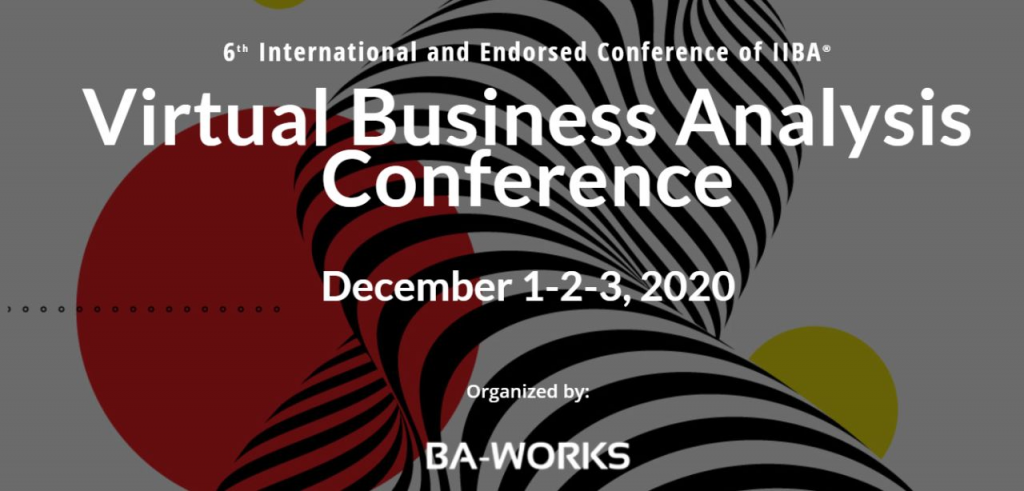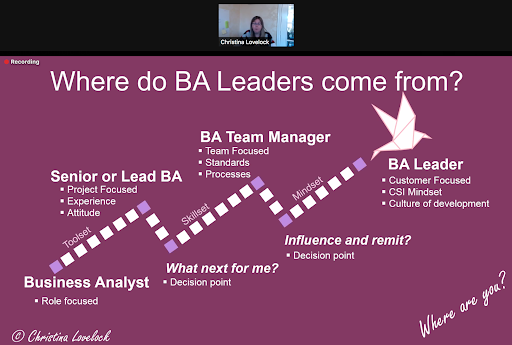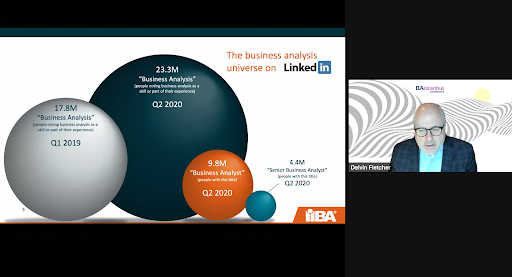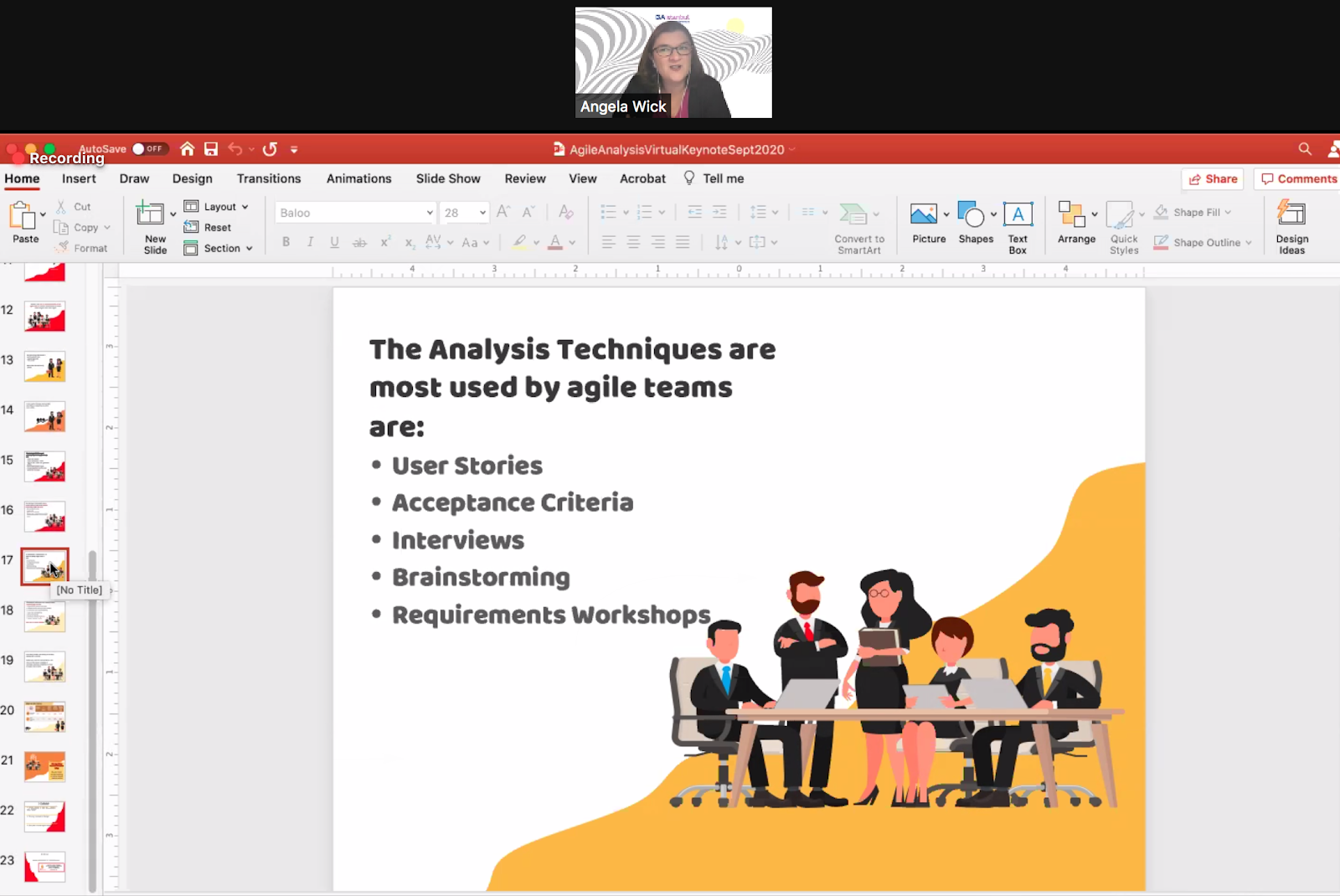As BA-Works, we held our annual conference as Virtual this year. It was a great conference experience with all our speakers, audiences, sponsors, and organizing team. We have proved that we can hold conferences virtually and come together by capturing the common positive energy and synergy in the virtual environment, too.

The opening speech was presented by Emrah Yayıcı and Meltem Bayrak. They emphasized that as our lives get more digitalized and our need for Virtual 3rd places has substantially increased. Physical 3rd places are designed by architects. On the other side, the design of Virtual 3rd places need transdisciplinary collaboration between architects and software engineers. In this context, Virtual BAistanbul Conference was a great virtual 3rd place in which Business Analysis Practitioners have discussed many trending issues, problems/effects of the pandemic to our way of working, future topics for BA’s, and so on…
Many takeaways are pointed out during the conference. According to all speeches, it is obvious that Business Analysis Practitioners have to improve their competencies and adapt themselves to new technologies. Ian Richards emphasized that Business Analysis practitioners have to be braver to challenge themselves on the toughest part; this perspective will bring them success and improvement. Besides, it has become crucial to have the courage to feel and act beyond being a translator between stakeholders.
We touched on many different issues at the BAistanbul conference. To summarize what we discussed during this event, we can handle four main parts through the takeaways. First of all, Business Analysis is not only a job, but it is a lifestyle. Victoria Cupet, Filip Hendrickx, Fabricio Laguna, Mohamed Zahran and Alexander Belin also underlined this mindset during the IIBA Chapter Leaders Panel. Adding to that, Joe Newbert said while home and business life are intermingled during the pandemic period, it has become essential to establish powerful connections with our stakeholders without losing our analytical perspective by building empathy and establishing good communication. Building strong relationships is the only way to make a positive change. So, it is crucial to understand the customers’ perspective, desire and satisfy the wish for products that match people’s needs. But how? Keynotes and speakers also discussed the new competencies and abilities that BA’s must-have.

Due to the pandemic, our standards and ways of working have been re-determined. Now there is a concept called Virtual Business Analyst. Here are the key considerations of Virtual Business Analyst from Christina Lovelock:

Build trust:
Use your emotional intelligence and build trust with your coaching skills and professional expertise.

Use Technology:
Do not be afraid of the technology; start with an open mind and learn new concepts. Use new trending collaboration tools, learn and master new technologies.
 Communicate Efficiently:
Communicate Efficiently:
Focus on what is possible remotely, not just the constraints. Use communication tools efficiently and try to build common understanding during communication.

Make empathy:
Empathy is the keyword to communicate efficiently. Decide the most efficient meeting hours for people and create optimized times with them. Listen to your stakeholders without prejudice. Johan Steyn added, “Do not forget that empathy cannot be replaced by robots/AI”. So, this is our golden key to elicit deeper insights. Adam Lawrence also emphasized the importance of empathy while talking about Service Design in a new digital reality.
 Don’t forget your culture and context while applying these steps.
Don’t forget your culture and context while applying these steps.
Every project and every product has a context, and all changes and needs occur within this context.

Secondly, Delvin Fletcher who is the President of IIBA stated that Business Analysis is bigger than Business Analysts. Adam Billing agreed with this statement and advised inviting users and stakeholders to collaborate more frequently and for shorter times. Use a mix of synchronous and asynchronous working to tap into diverse styles and improve outcomes. Jared Gorai also advised Business Analysts to be curious, utilize data analysis, use data tools, create visuals, and tell the story of data. As a collaborative BA, do not forget to involve the stakeholders while telling the story of the data and sharing the insights to provide a common understanding.
In the “Now and Future of Business Analysis” panel session, Dilek Duman, Zehra Öney, Emel Arseven, and Gül Erol emphasized its importance to bring well-trained business analysts to the industry who are capable of asking the right questions at the right context. They also stated that business analysts would be needed much more in direct proportion to the developing and changing technology in the near future.
The third main issue was Agile Business Analysis; there is a misunderstanding that business analysts have no place in the agile world. David Klimek emphasized that developing towards “Generalizing Specialist” and being able to do other tasks when needed may cause a lack of senior analysts in the future. According to the observations of Agile transformations; the total number of analysts stays stable after agile transformation because analysis work does not disappear. Ayşe Büyükkaya emphasized that agile transformation’s main success factors are; having a dedicated team to support BAs and executive support. So, Business Analysts aren’t going anywhere, but business analysis shall become more responsive to change and more iterative. Bits of advice for BA’s in agile world:
-
- Mohamed Zahran advised the IIBA Chapter Leaders Panel to make all requirements small, make them easy, make your work more professional.
- Angela Wick added that the essential part while applying agile methodology is the skillset and the mindset.
- Richard Kasperowski stated that the product vision is an essential part when we start to play with our product; the backlog should be aligned with the vision to produce the best value.
- Ryan Folster reminded that more text brings more ambiguity, the objective should be lean documentation, most of the time drawing is better than writing.
- Make decisions, manage risks, respond to threats, pivot as things change – not become experts in tools
- Joe Newbert underlined that the very best technique is to combine your techniques to prepare well-defined business analysis documents in an agile environment.
- Yuriy Gaiduchok also made a point that it is vital to define quality attributes clearly.
- GK VanPatter gave this message that it is essential to give sense-making the value it deserves if a BA wants to apply efficient design thinking methodologies.
- According to the speech by Gizem Kedici Özbayraç, innovations that bring benefit to the organization are not triggered by an end product description. So not to start from prescription but from the symptoms.

Angela Wick also showed that the most used analysis techniques used by agile teams are;
User Stories, Acceptance Criteria, Interviews, Brainstorming and Requirement Workshops.
Final issue was Cybersecurity. Rainer Wendt reminded us not to forget the importance of Cybersecurity, especially for large projects. Security work is part of the project work and therefore needs to be analyzed, budgeted and managed. When this part is ignored by all stakeholders, security can eventually slow down the project. Business analysts play a key role to elicit hidden/forgotten security needs. This issue shall be managed thoroughly by well-educated experts, in order to avoid or mitigate company security risks effectively.
All in all, it can be said that a much more challenging period awaits business analysts in the future. Arne Van Oosterom emphasized if a person can be replaced by an algorithm, that person will be replaced by an algorithm. The good thing is that if we can develop our set of competencies, adapt to the changing world with an innovative mindset and make an efficient analysis as an analyst in the agile world, we will be positioned as business analysts where we deserve.

